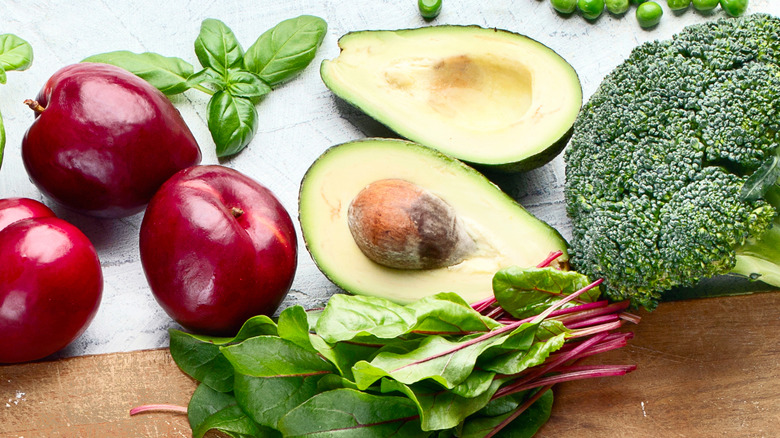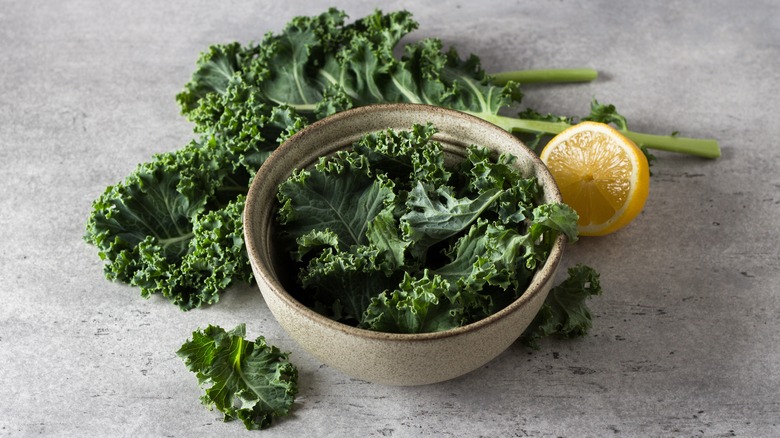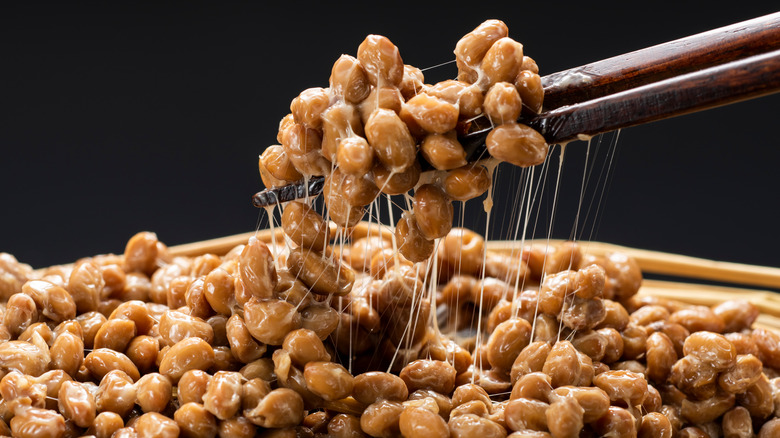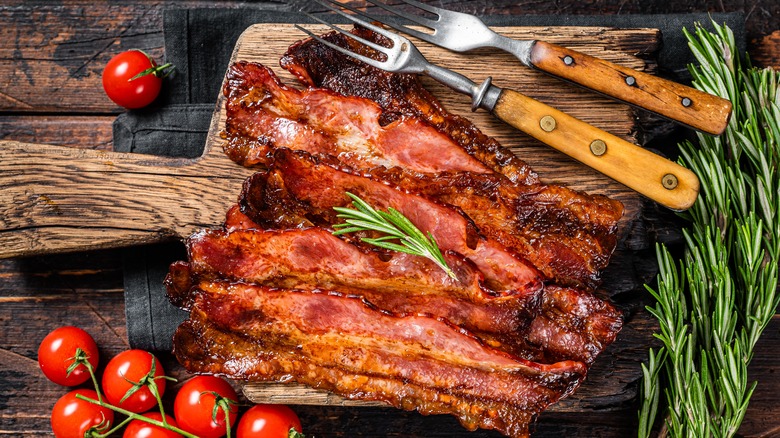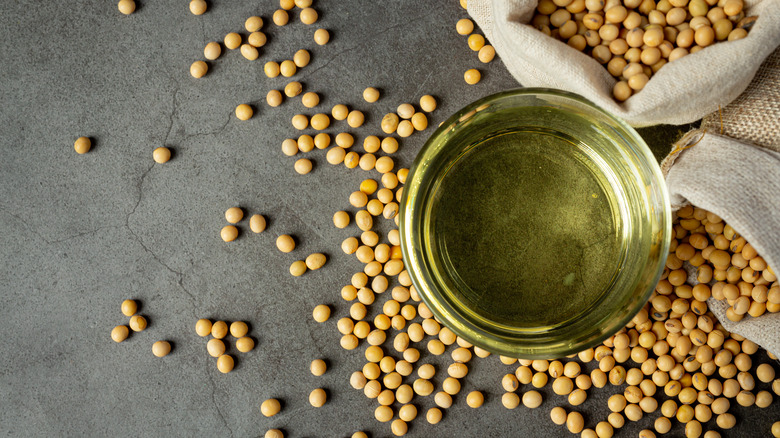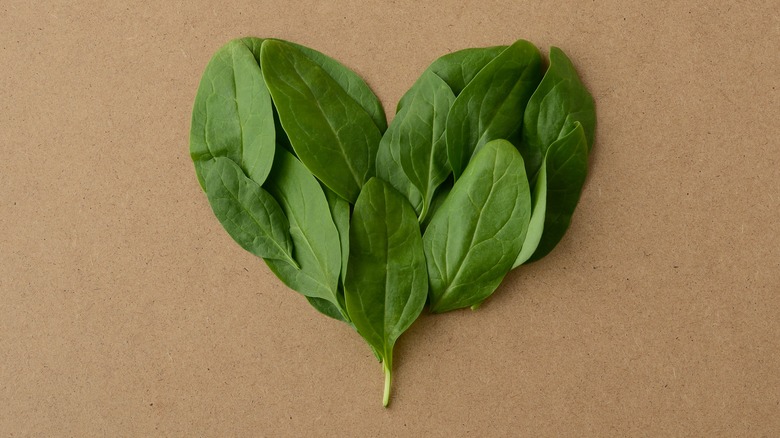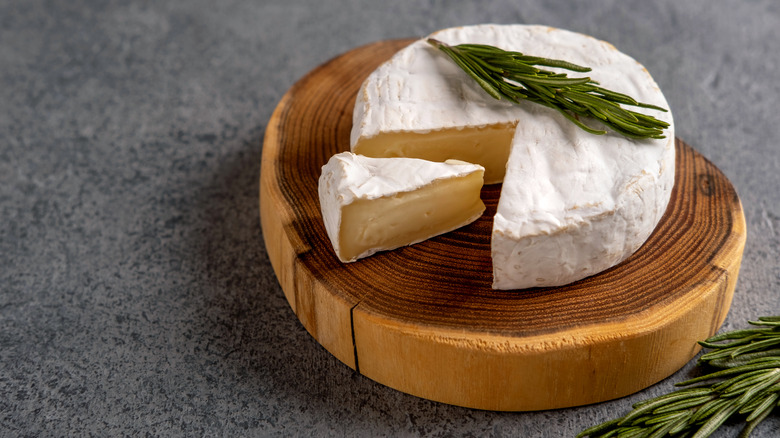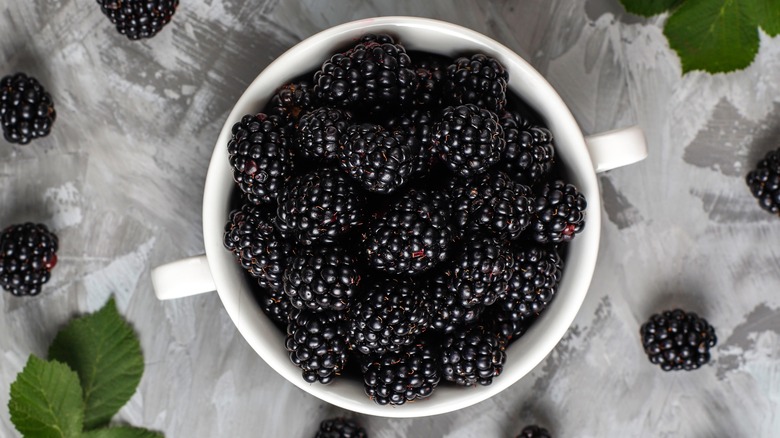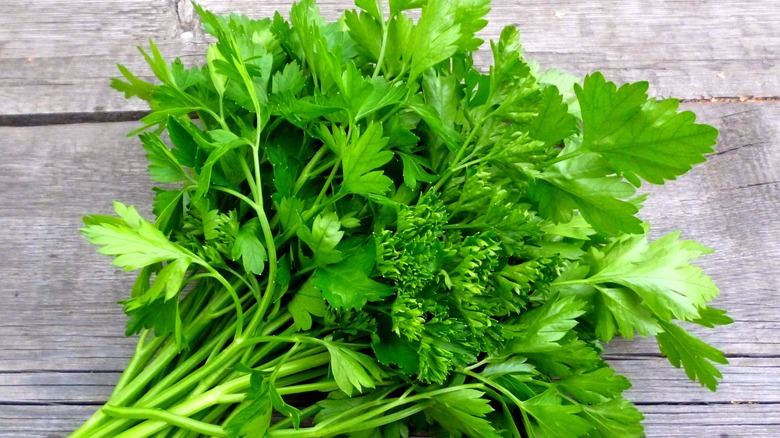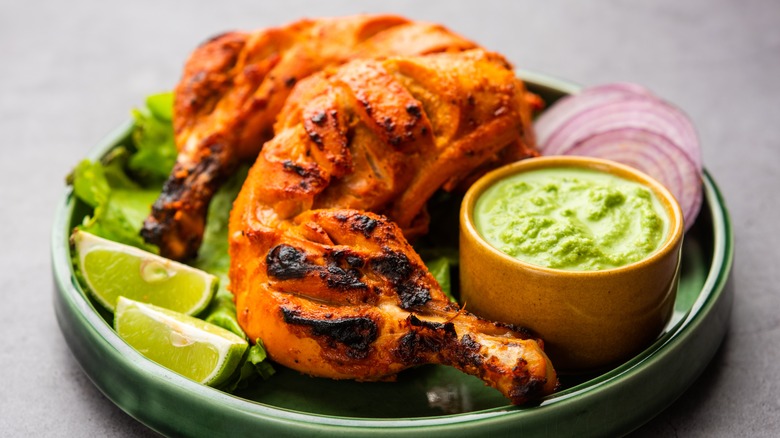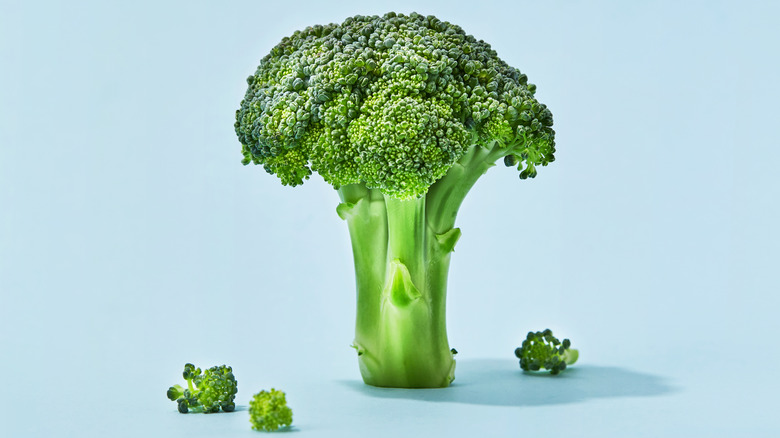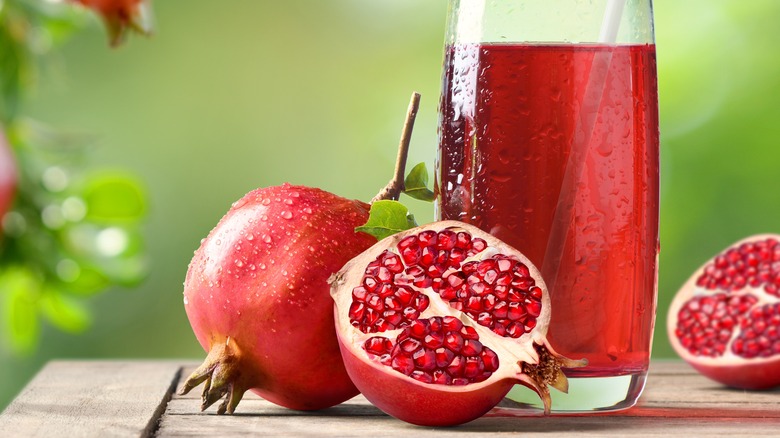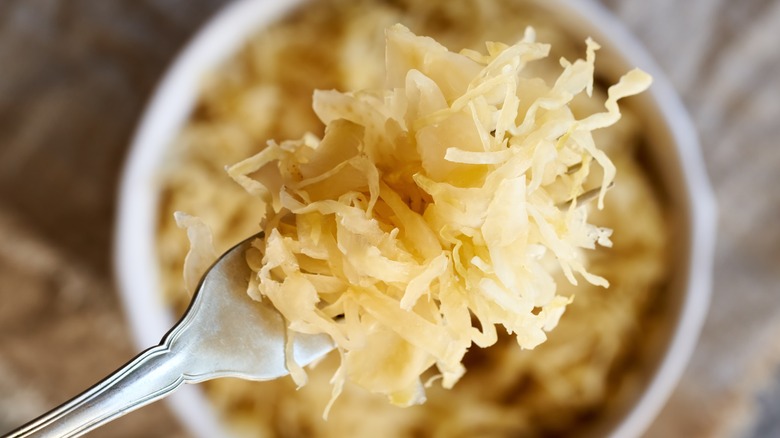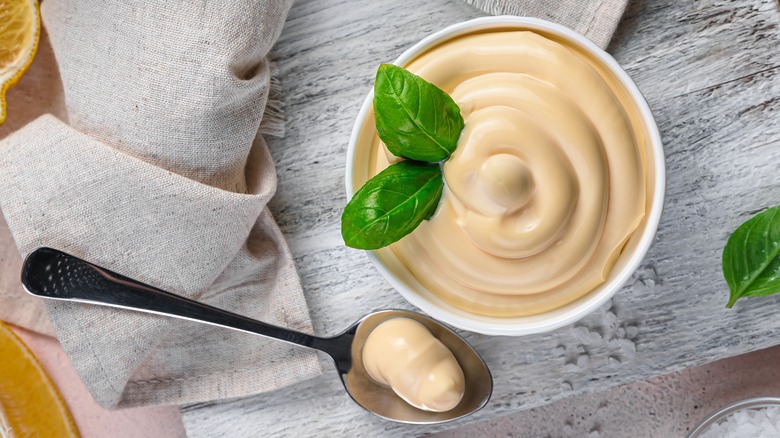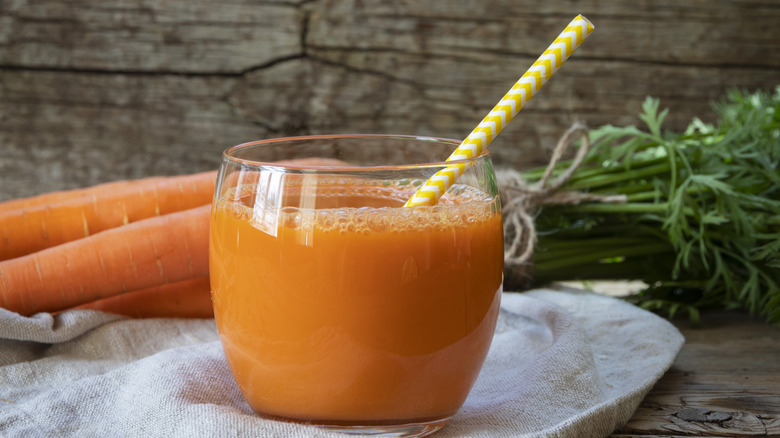14 Foods That Are Rich In Vitamin K
It can sometimes feel like there are a lot of vitamins out there, and trying to keep track of your intake of all of them is pretty challenging. And so we wouldn't be surprised if, in the endless endeavor to keep what we call the more well-known vitamins like C, D, and B vitamins of all types topped up, other nutrients get forgotten about. Arguably, vitamin K falls into this category — but like vitamins of all kinds, it's super important for our health.
Vitamin K (which is actually two different vitamins, K1 and K2) plays an essential role in our blood health, enabling our blood to clot effectively, as well as having a relationship with our bone health (via Healthline). Unlike other vitamins, having a deficiency in vitamin K is uncommon, thanks to the fact that our bodies are pretty good at stockpiling and using the K1 that we eat and the K2 that our systems create (and also because our diets generally contain enough vitamin K without the need for conscious adjustment).
But for some folks with pre-existing medical conditions or medication requirements, not having enough vitamin K can be a problem. And because we love to make sure you know you're getting enough of the good stuff, we decided to put together a list of all of the foods you need in order to get enough of this vital vitamin.
Kale
Vitamin K? More like vitamin K-ale, are we right?! Anybody? ... No? Okay, we admit, we need to work on our vitamin-based jokes. Terrible puns aside, there's no denying that if you're looking for more sources of vitamin K, kale is pretty much the best thing you can include in your diet.
For each cup of raw kale you pile into your salad, you'll be consuming around 176 micrograms of vitamin K, states WebMD. Given that you should seek to obtain 1 microgram of vitamin K for every kilo you weigh each day, if you weigh lower than 90 kilograms, you can cover your entire vitamin quota with just one serving of this marvelous leafy green (per the NHS).
Pretty good, right? And that's before you consider all of the other health benefits of kale, which are frankly music to our ears. Kale is almost absurdly nutritionally dense, and delivers whopping quantities of vitamin A and vitamin C, as well as essential minerals (per Healthline). Alongside vitamin C, it also contains the antioxidants kaempferol and quercetin, which may have anti-inflammatory and heart-protecting effects. Plus, zeaxanthin and lutein, two other antioxidants in kale, may have positive and preserving effects on your eyesight. Pass us the kale!
Natto
This distinctive Japanese food is potentially more well-known for its unique texture and taste than for its nutritional properties. But it's also a powerhouse when it comes to vitamin K. Natto is especially high in vitamin K2, providing 150 micrograms of the vitamin in just one tablespoon, says WebMD. This is approximately two times the amount that's recommended to be consumed in an entire day, making this bean-based dish one of the best vitamin K sources out there.
Natto's vitamin K content is particularly notable, as most foods that are rich in the nutrient generally contain K1. While the two vitamins perform similar functions and work together to safeguard your health, vitamin K2 has its own specific health benefits. One such benefit may be to your heart health, with vitamin K2 potentially working to dissipate calcium deposits that can build up in your arteries and impact your cardiovascular system, leading to an increased likelihood of heart disease. Vitamin K2 may also be particularly beneficial for your bone health, and while further research is needed, it could also have a positive benefit on the development of cancer, limiting the rate at which cancer cells grow.
Bacon
Okay, so we know what you're thinking. Bacon isn't exactly a health food, and eating it for a specific vitamin alone probably isn't going to do you a huge amount of favors elsewhere. We're not going to argue with you on that one, but the fact does remain that bacon is one of the best meat sources of vitamin K you can consume. Bacon is especially rich in vitamin K2, and eating 100 grams of it can deliver 35 micrograms of the nutrient, says Healthline. That's almost 30% of your recommended daily value.
In addition to this, we shouldn't forget that bacon does have some other nutritional positives, too. Bacon's famed for its salty taste, but that salt — and the potassium that also resides in the meat — could have positive benefits for rehydration (especially when you have a hangover), according to WebMD. It's also a source of protein, the nutrient that's so vital for us to create and repair our cells and grow our muscles (per MedlinePlus).
There's no denying, however, that despite these helpful attributes, eating the higher amounts of sodium present in bacon could lead to worsening health consequences, and its fat and cholesterol levels may also have a negative impact. It's for this reason that, from a health perspective, bacon is best enjoyed in smaller quantities.
Soybean oil
We generally don't associate oil with having vitamins. Sure, certain oils have some well-known benefits, like olive oil's protective effects around cardiovascular disease (per Harvard Health Publishing), but we tend to be less aware of the vitamins in these substances. For vitamin K, however, you can't go wrong with using soybean oil.
Made with the same beans that create the vitamin K-loaded natto, soybean oil provides approximately 25 micrograms of the nutrient per tablespoon serving, according to Prevention. Soybean oil is also a rich source of polyunsaturated fats, and these fats (which include omega-3s) could have good implications for your heart health, just like with olive oil (via Livestrong).
It's important, however, to not have too much of a good thing. "It should be noted that soybean oil is higher in omega-6 than many other plant oils, and too much omega-6 may cause inflammation," states registered dietitian Natalie Rizzo. Soybeans are also frequently GMOs, which may be problematic when it comes to allergies or if you're taking antibiotics. Despite this, Rizzo says that it should be okay to consume moderate amounts of soybean oil as part of a healthy diet.
Spinach
We gotta admit, Popeye was on to something when it comes to spinach. And though the cartoon character consumed the green vegetable for his muscles, we like to think that somewhere in the back of his mind, he knew about its vitamin K content as well.
Spinach is incredibly rich in vitamin K, and in a cup of raw leaves, you'll get more than enough to last you the day, states Healthline. Cooking your spinach, which allows you to eat far more of it — we've all seen how much it wilts, right? It's wild; it just disappears – can result in you getting even more vitamin K, with 444 micrograms for just a half cup.
We'd also be remiss if we didn't talk about spinach's other health bonuses. The leafy green is especially rich in iron. This mineral works alongside vitamin K to contribute to healthy blood, with iron assisting in generating red blood cells and moving oxygen around our system, says registered nutritionist Jo Lewin (via BBC Good Food). In addition, spinach delivers good quantities of phosphorus, magnesium, and calcium, all of which play a large role in bone health.
Soft cheese
We're flying the flag for cheese today, people. Too often, the health benefits of cheese can get forgotten about, but we should always remember that it can provide notable nutritional benefits, one of which is in delivering vitamin K to our diets.
Soft cheese is especially rich in the vitamin. For every 100 grams of soft cheese you eat, you'll be consuming approximately 506 micrograms of vitamin K, according to Medical News Today. Given the 1-to-1 ratio that's recommended for each kilo of body weight to each microgram of vitamin K daily, soft cheese has you covered on the vitamin front. It's also important to remember that cheese is one of the best sources of calcium out there, with roughly 60 grams of soft cheese (like brie or camembert) providing around 240 milligrams of calcium, per the International Osteoporosis Foundation.
Both calcium and vitamin K are instrumental in promoting proper bone health. Although further studies need to be conducted on the role of vitamin K in particular, research published in the Journal of Osteoporosis states that people who have diets lower in vitamin K1 and K2 tend to be more likely to experience bone fractures and have lower bone mineral density.
Blackberries
Honestly, if you aren't a huge fan of blackberries already, you will be once you hear about their vitamin K content. Although vitamin K tends to be way more abundant in vegetables and some meats, blackberries are one of the MVPs when it comes to fruit-based sources, with 20 micrograms per 100 grams of berries (via Healthline). While this may not sound like a lot, that's still almost 20% of your recommended daily value in just a few handfuls.
And if this fruit's vitamin K levels haven't converted you into a blackberry devotee, its other health benefits might. Blackberries are full of vitamin C, which not only serves to keep your immune system healthy, but also has a positive effect on your blood health alongside vitamin K, working to help you assimilate iron into your system (per the Cleveland Clinic). Additionally, blackberries are rich in fiber, providing 7.6 grams per cup serving. "Most people don't get enough fiber in their diet, which can increase their risk of heart disease," according to registered dietitian Julia Zumpano. Fiber can also have powerful effects on your digestive system, keeping food moving through your system smoothly.
Parsley
Parsley is used far more often for its sprightly taste than for its health benefits, but you shouldn't write off the herb just yet. Parsley is, pound for pound, one of the richest sources of vitamin K there is. Just 30 grams of the herb provides a jaw-dropping 547% of your recommended daily intake of vitamin K, according to Healthline, meaning that a simple garnish on a meal could set you up with more than enough of the vitamin.
And there's more to this humble herb than just a truckload of vitamin K. It's also sky-high in vitamin A and abundant in vitamin C, two nutrients that may serve to help your eye health and reduce oxidative stress, respectively. Additionally, parsley has a great quantity of folate, with 30 grams delivering 11% of what you should be getting of the B vitamin every day. This may prove to be beneficial for your heart health. As research published in the journal Stroke shows, folate intake appears to directly correspond to death from heart-related conditions, with heart failure, stroke, and coronary heart disease all resulting in fewer deaths amongst those who had higher folate levels. If that isn't reason enough to garnish your food, we don't know what is!
Chicken
Ah, chicken. So modest, so versatile, and so nutritious. We tend to praise chicken for its ability to slot into any dish and its protein content, but it's less often that we think about the vitamins it contains. But as it turns out, chicken is especially good as a vehicle for vitamin K2.
100 grams of regular chicken meat contains approximately 10 micrograms of vitamin K2, according to WebMD, making it one of the better meat options out there for this nutrient. Additionally, chicken's pretty good when it comes to other vitamins and minerals like B12, copper, zinc, and choline (per WebMD).
Vitamin K2 is an important nutrient for bone health and assists calcium in building a stronger skeleton. And the protein in chicken may also be useful to reinforce your bones. As a study published in the International Journal for Vitamin and Nutrition Research discusses, eating more protein may result in a lower likelihood of bone fractures and a higher bone mineral density, particularly in older adults. It should be pointed out, however, that following an especially high-protein diet may not be the wisest choice.
Broccoli
We consider one of our greatest achievements in life to be learning to love broccoli. We don't know about you, but we didn't start out loving it as kids — but look at us now! We can't stop talking about the cruciferous vegetable's health benefits, including its premium vitamin K content.
Broccoli, alongside many other green vegetables, is full of vitamin K, with a cooked half-cup providing 110 micrograms of it, according to Prevention. That's more than a lot of people need in an entire day, based on the 1-to-1 ratio of micrograms to each kilo of body weight.
But that's not the only reason why we love broccoli now, folks. While we usually think of oranges and lemons to be the best source of vitamin C, broccoli's up there with those citrus fruits in terms of its content. "Broccoli strengthens your immune system and removes free radicals and toxins from the body. It also helps maintain healthy skin and keeps your heart healthy," in large part thanks to its vitamin C levels, states Real Nutrition founder and registered dietitian Amy Shapiro (via Prevention). As we have also discovered, it's also very delicious roasted, in a stir fry, or pretty much anywhere. We're sorry for all the years we wasted without you, broccoli.
Pomegranate
We think of pomegranates a little like jewel boxes: Open up that unassuming exterior, and inside are glistening treasures, ready to be enjoyed. And the wonderful thing about pomegranates is not just that each seed is a delicious morsel in itself; those seeds are also incredibly good for you.
Pomegranates contain a good amount of vitamin K per serving, as Medical News Today points out. And if you're drinking pomegranate juice, you're also in luck, with 100 milliliters of bottled pomegranate juice typically containing 10.4 micrograms of vitamin K, according to the USDA.
That's not all, folks. Pomegranates are particularly high in antioxidants called polyphenols, chemical compounds found in many plant-based foods that may combat the impact of toxins on your body and reduce your susceptibility to chronic conditions. The polyphenols present in pomegranates and pomegranate juice could also be helpful for people with irritable bowel syndrome (or IBS), with their anti-inflammatory effect assisting in reducing symptoms. This anti-inflammatory effect may also extend to a range of other chronic diseases, like arthritis or heart disease, and may even help people preserve their memory and brain function. That's a treasure that we think is worth keeping.
Sauerkraut
Put a mound of sauerkraut on our plates and we're in heaven. Honestly, we can't get enough of fermented food. But although sauerkraut is frequently praised for its fermented properties, there's one other thing you should be celebrating it for: its vitamin K content. Sauerkraut is a great source of vitamin K2, and contains roughly 2.75 micrograms per half-cup serving, according to WebMD. While this isn't as much as some other food sources, as condiments go, it's not bad.
But how could we talk about sauerkraut and not talk about its probiotic benefits? Along with other fermented food products like kimchi and kefir, sauerkraut is full of probiotics which act as delicious food for your gut bacteria, states registered nutritionist Nicola Shubrook (via BBC Good Food). This probiotic nature has a wealth of health benefits almost too numerous to count, including the ability to support the immune system, potentially help cholesterol levels, and keep the digestive system healthy. This last positive is also reinforced by sauerkraut's fiber content, which is high thanks to its cabbage-based nature. Remember, though, that while sauerkraut may be catnip to your gut, it is also frequently high in salt and sodium, so don't go overboard.
Mayonnaise
We don't know about you, but when we're slopping mayonnaise onto a burger bun, we're usually not thinking about its nutritional advantages. But one thing that might make the act of doing so a little more pleasant is to know that mayo is a pretty great source of vitamin K. Just a single tablespoon of mayonnaise provides a somewhat surprising amount of the vitamin, with 22.5 micrograms for each serving — almost 20% of your daily recommended value (per Eat This Much). Not bad, huh?
Bear in mind, though, that while vitamin K is important for the blood to clot effectively, it may not benefit everyone to have higher amounts of it in their food. Individuals who take warfarin, which is designed to thin the blood and prevent clotting, are advised to keep an eye on their vitamin K intake, as consuming larger amounts of it can negate the efficacy of the medication (per the Mayo Clinic). It's for this reason that the Indiana Hemophilia & Thrombosis Center advises making your own mayonnaise if you take warfarin, as you're able to discern which oils are going into the condiment, thereby avoiding oils that have more vitamin K in them (like soybean oil). Opting for a light mayo can also help if you don't want to go overboard on your vitamin K intake.
Carrot juice
Carrots, and carrot juice, are well known for helping you see in the dark, thanks to their vitamin A content. But that's not the only nutrient in them that could improve your night vision (or your vision overall).
Carrots and their juice are an excellent vehicle for vitamin K, with just six ounces of carrot juice providing 28 micrograms of the nutrient, according to Prevention. Research published in the journal Investigative Ophthalmology & Visual Science has shown a potentially positive link between consuming vitamin K1 and the maintenance of the retinal structure after glaucoma surgery, although it's important to point out that this study used a relatively high dose of supplementation.
And when you combine that with the fact that vitamin A bolsters your eye surface, carrot juice is an all-around winner for your peepers. That's why registered dietitian Alice Shapiro recommends having a glass daily. "Add a glass to your breakfast each day to boost your metabolism, strengthen the immune system, and improve skin," Shapiro advises via Prevention. Hey, we don't need to be told twice!

